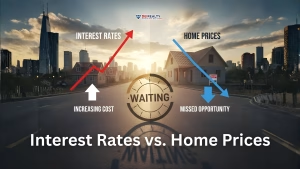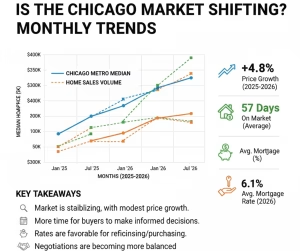Deciding whether to buy or rent a home in Chicago is one of the biggest financial choices you’ll make. With Chicago’s diverse neighborhoods, fluctuating market conditions, and lifestyle considerations, the right decision depends on your personal goals and financial situation. Here’s a breakdown to help you decide.
1. Understanding the Current Market Conditions
As of 2025, Chicago’s real estate market is stabilizing after a period of rising prices and fluctuating mortgage rates. According to Redfin, home prices increased by 5.3% in 2024, with modest growth expected in 2025. Meanwhile, rental rates have increased by 8% year-over-year, making both options competitive in certain areas.

(source: Realtor.com)
Key Insight: While mortgage rates have risen, owning a home can build long-term equity, while renting may provide greater flexibility.
2. Pros and Cons of Buying a Home in Chicago
Pros:
- Equity Growth: Monthly mortgage payments contribute to your property ownership.
- Tax Benefits: Mortgage interest and property tax deductions can reduce taxable income.
- Fixed Costs: Fixed-rate mortgages provide stable monthly housing expenses.
- Creative Control: Homeowners can renovate or modify their property as desired.
Cons:
- Upfront Costs: Down payments, closing costs, and maintenance expenses add up.
- Market Risk: Home values can fluctuate with the market.
- Long-Term Commitment: Buying requires a long-term financial outlook.

(source: iStock images)
3. Pros and Cons of Renting a Home in Chicago
Pros:
- Flexibility: Renting offers short-term commitment, ideal for those unsure of their long-term plans.
- Lower Upfront Costs: Security deposits are far lower than down payments.
- Maintenance-Free Living: Landlords typically cover major repairs and maintenance.
Cons:
- No Equity Growth: Monthly rent payments do not build wealth.
- Rent Increases: Lease renewals may bring unexpected rent hikes.
- Limited Control: Tenants may face restrictions on renovations or customization.

(source: Luxury Apartments Chicago)
4. Cost Comparison: Buying vs. Renting in Chicago
For a fair comparison, consider the costs associated with each option:
Buying:
- Median Home Price: $350,000 (Chicago average)
- 20% Down Payment: $70,000
- Monthly Mortgage (at 6%): ~$2,100 (including taxes and insurance)
Renting:
- Average Rent for a 2-Bedroom Apartment: ~$2,200/month
- Security Deposit: Typically one month’s rent

(source: Space Coast Credit Union)
5. Lifestyle Considerations
Your lifestyle goals play a key role in the decision-making process:
- Stability Seekers: Buying may be better if you plan to stay in one place for five or more years.
- Frequent Movers: Renting offers more flexibility for career changes or lifestyle shifts.
- Neighborhood Preferences: Renting may be more affordable in trendy areas like Wicker Park, while buying offers better value in emerging neighborhoods like Bronzeville or Avondale.

(source: Elle Baker Photography)
6. Investment Opportunities
For those considering Chicago as an investment, buying a property may provide opportunities for rental income, particularly in areas with high demand like West Loop or Logan Square.
Conclusion: What’s Best for You?
Choosing between buying and renting in Chicago depends on your financial readiness, lifestyle goals, and long-term plans. Buyers may benefit from building equity and tax savings, while renters enjoy flexibility and fewer upfront costs.
If you’re unsure which option is right for you, consulting with a local real estate professional can provide insights tailored to your situation. Whether you’re buying or renting, understanding Chicago’s dynamic market will empower you to make a confident decision.





